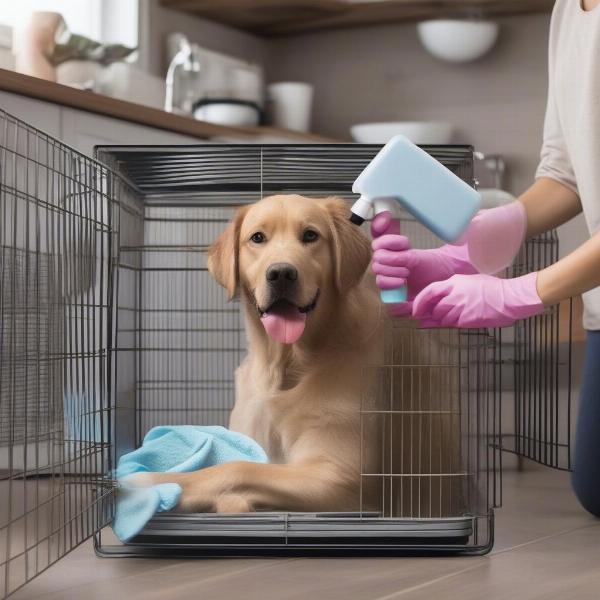Crate training can be a rewarding experience for both you and your dog, providing a safe haven and aiding in housetraining. However, accidents happen, and finding poop in your dog’s crate can be frustrating. Understanding why your dog is soiling their crate is the first step to resolving the issue and creating a positive crate training experience. This article will guide you through the common reasons for crate soiling and provide practical solutions to help you stop your dog from pooping in their crate.
Why is My Dog Pooping in Their Crate?
Several factors can contribute to a dog pooping in their crate. It’s crucial to remember that this behavior is rarely out of spite or revenge. Instead, it’s often a sign of underlying issues that need addressing.
- Too Much Crate Time: A dog confined for extended periods may have no choice but to relieve themselves inside. Puppies, especially, have smaller bladders and require more frequent potty breaks.
- Medical Issues: Underlying medical conditions like digestive upset, parasites, or food intolerances can lead to a loss of bowel control. Consult your veterinarian to rule out any medical reasons for the soiling.
- Anxiety or Stress: Separation anxiety, fear of the crate, or a stressful environment can cause a dog to poop in their crate.
- Incomplete Housetraining: If your dog isn’t fully housetrained, they may not yet understand that the crate is not a bathroom.
- Crate Size: A crate that’s too large can encourage a dog to eliminate in one corner and sleep in another.
Effective Strategies to Stop Crate Soiling
Once you’ve identified the potential cause, you can implement strategies to address the issue:
- Establish a Potty Routine: Take your dog out for potty breaks first thing in the morning, last thing at night, and at regular intervals throughout the day. Consistency is key!
- Limit Crate Time: Ensure your dog isn’t spending excessive time in their crate. Gradually increase crate time as they become more comfortable.
- Proper Crate Size: The crate should be large enough for your dog to stand, turn around, and lie down comfortably, but not so large that they can create a separate potty area.
- Clean Accidents Thoroughly: Use an enzymatic cleaner specifically designed for pet messes to eliminate odors that might encourage repeat offenses.
- Positive Reinforcement: Reward your dog with praise and treats when they eliminate outside.
 Cleaning Dog Crate
Cleaning Dog Crate
Addressing Anxiety and Stress
If anxiety or stress is a contributing factor, consider the following:
- Create a Positive Crate Environment: Make the crate a comfortable and inviting space with soft bedding, toys, and perhaps a familiar blanket or clothing item that smells like you.
- Crate Training Gradually: Introduce the crate slowly, starting with short periods and gradually increasing the duration. Never force your dog into the crate.
- Consult a Professional: If anxiety is severe, consult a certified dog trainer or veterinarian behaviorist for guidance on desensitization and counter-conditioning techniques.
What if My Dog is Already Housetrained?
Even housetrained dogs can regress and start soiling their crates. This can be due to changes in routine, stress, or medical issues. If your previously housetrained dog starts pooping in their crate, consult your veterinarian to rule out any medical concerns. Review your crate training methods and ensure the crate is a positive and comfortable space.
Conclusion
Stopping your dog from pooping in their crate requires patience, consistency, and understanding. By addressing the underlying cause and implementing the strategies outlined in this article, you can create a positive crate training experience and help your dog feel safe and secure in their den.
FAQ
- My puppy is still pooping in his crate, what should I do? Puppies have smaller bladders and need more frequent potty breaks. Ensure you’re taking your puppy out regularly, especially after waking up, eating, and playing.
- My dog only poops in his crate when I’m gone, is it separation anxiety? It could be. Consult a veterinarian or certified dog trainer to determine the cause and develop a behavior modification plan.
- What’s the best way to clean a crate after an accident? Use an enzymatic cleaner specifically designed for pet messes. This will eliminate the odor and discourage repeat offenses.
- How long can I leave my dog in a crate? This depends on your dog’s age and individual needs. Generally, adult dogs shouldn’t be crated for more than 6-8 hours at a time.
- Can I punish my dog for pooping in the crate? Never punish your dog for soiling their crate. This will only create fear and anxiety, making the problem worse.
- What if nothing seems to work? If you’ve tried everything and your dog is still pooping in their crate, consult a veterinarian or certified professional dog trainer for personalized advice.
- Is it normal for a dog to poop in their crate occasionally? Accidents can happen, even with well-trained dogs. If it becomes a regular occurrence, investigate the underlying cause.
Related Articles
(No related articles found)
About ILM Dog
ILM Dog is your trusted international resource for all things dog-related. We offer expert advice on dog breeds, health, training, nutrition, grooming, and much more, catering to both novice and experienced dog owners worldwide. Whether you’re looking for help with housetraining or choosing the right breed for your lifestyle, our team of experts is here to support you every step of the way. For personalized guidance on dog care and training, contact us at [email protected] or call us at +44 20-3965-8624. Visit ILM Dog today!